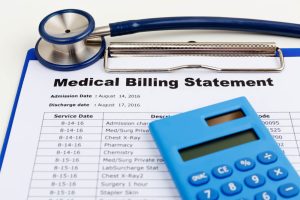Addressing Outstanding Medical Expenses in a NJ Divorce
Considerations to Determine How Medical Bills will be Assigned in Divorce in New Jersey

The Process for Paying Medical Bills in New Jersey
The law in New Jersey requires one spouse to pay the medical debts of the other under specific conditions. Under the Doctrine of Necessaries, both parties are responsible for paying for necessary services provided to either spouse. The rationale is that such services benefit the family. However, for a third-party creditor to receive payment for medical services provided to one spouse from the other, the creditor must first seek compensation from the spouse who incurred the debt. So, if one party incurred medical bills for an appendectomy, the medical provider must first seek payment from the patient. Once the creditor attempts to collect the debt without success, they can try to collect it from the patient’s spouse. However, the creditor must show they could not get paid because the spouse receiving the medical services does not have enough money or assets to pay the debt, and the spouses are in a viable marriage.
What is Considered a Viable Marriage for Medical Debt Purposes?
A viable marriage is one that subsists, and the spouses are a “financial unit,” as the court in National Account Systems, Inc. v. Mercado, 196 N.J. Super. 133 (1984) described. In that case, the court examined whether a spouse must pay for her deceased husband’s medical bills. The parties separated for four years, during which the medical procedure occurred. Though neither party filed for divorce, the parties never cohabited during those four years and made no support payments to one another. They were financially independent, so the court ruled that the surviving spouse was not responsible for her spouse’s medical debt.
What Happens to Medical Debt If a Partner Passes Away while they are Still Married?
If one spouse dies while the married couple is separated, the surviving spouse most likely is not on the hook for the estranged spouse’s medical debt incurred during the separation. However, for separated spouses who still cohabitate, or one party supports the other, the surviving spouse may be responsible for the deceased spouse’s medical bills. Typically, the deceased spouse’s estate pays the debts from estate proceeds. However, the surviving spouse may owe medical providers for the unpaid medical debt if there are no assets.
Thus, both parties are responsible for medical care provided to one spouse unless the medical bills arise before marriage or a prenuptial agreement excludes medical bills from an equitable marital split in a divorce. For older couples, divorce may be the answer to avoiding the debt to the healthy spouse. Planning advice from an attorney may include divorcing if the parties’ marriage is unstable and one party faces mounting medical bills in the future. After all, one spouse’s chronic health issues may topple an already strained marriage. Additionally, a divorce may allow the health-challenged party to qualify for Medicare for long-term care.
Payment for Medical Expenses for a Child of Divorced Parents in NJ

The parents split anything above the $250.00 per their separation agreement, divorce decree, or other court order. Like support, the parties may each be responsible proportional to their incomes in an income shares approach to children’s medical bills. So, when one party’s income is 50% higher than the other, the wealthier parent pays 75% of the total reimbursed medical costs above the initial $250.00 annually if both parties agree to this method. Likewise, they can decide to split the unreimbursed costs equally.
What Happens if Divorcing Parties Can’t Reach an Agreement on Medical Expenses?
Divorcing parties can decide how they split the bills in their marital settlement, separation, or other agreement. A family law attorney can help parties devise creative solutions if they cannot agree on a formula. Otherwise, the court determines and enforces unreimbursed medical expense orders. So, if the custodial parent lays out the medical and dental costs insurance does not cover throughout the year, they can demand reimbursement for what the noncustodial parent owes. And if necessary, the custodial parent can bring a motion for reimbursement to a family court judge to get paid.
We can Help with Reaching a Favorable Outcome on Medical Debt and Bills in the Divorce Process in Passaic County NJ
The law requires both parties to pay unreimbursed medical expenses for their children, so a party should have good reason to refuse payment. A party who must resort to the family court to get reimbursed for children’s medical expense outlays can also ask the refusing party to pay their attorney’s fees. When parties cannot agree on ordinary expenses or how extraordinary medical costs get paid for children with special health needs, they can mediate their differences through an attorney. If you are facing these issues and uncertain about who to turn to for help, a family law attorney at Montanari Law Group can explain the law on medical bills and divorce. In addition, we can suggest a method that addresses both parties’ concerns regarding proof of expenses and the necessity for medical treatment.
If you cannot mediate your differences, our attorneys are ready to battle it out in court. Contact us at (973) 233-4396 to discuss your concerns, goals, and objections with a family lawyer before going to court to resolve disputes. If you are divorcing or separated and need advice about medical bill payments for your spouse or your children, you should discuss your case with an experienced family law attorney at our Passaic County firm, serving clients in Fairfield, Woodland Park, Jersey City, Hoboken, North Caldwell, Montclair, Hackensack, North Bergen, and Paterson. Knowing your legal responsibilities and rights under the law may avoid a trip to court and save you money in the long run. It may also solidify the need to head to court for the right solution. No matter what, we are committed to assisting with assessing all of your options and pursuing the best path to reach your goals.
